In this concluding section of the NCAER report ‘Skilling India: No Time to Lose’[i] we examine Anticipating and Adapting Skills – part of the circle of acquiring-matching-anticipating skills framework aimed at policy and decision makers for more efficacious skill building in India.
Read the earlier parts of the report summary here
Anticipating and adapting skills require continuously scanning the work landscape to make meaningful changes to upskill or re-skill workers to meet changes brought about by shifting and changing market trends. Skilling initiatives should build worker adaptability for jobs that can be foreseen (job/task specific skills) and unforeseen (higher-order transferable skills). A culture of lifelong professional development is the crux of an agile workforce. We ask, how much of this ideology exists today in India’s myriad skilling programmes and the institutions implementing them?
Not enough we think, as there appears to be an urgency to skill with an almost shotgun approach to rank up enrollment and placement numbers. This highly detrimental tunnel vision, at best a stopgap measure, impedes long-term workforce development. This report unequivocally states that all government and private skilling policies and schemes must shift focus to equipping Indian workers with skills to replace lifetime employment with lifetime employability. And anticipating skills and adapting to change are crucial ways of getting there.
Structural and Technological Change
The report argues that skilled labour and technology are complementary, but technology can trump unskilled labour and routine jobs. It’s the jobs requiring higher-order cognitive skills, for instance creativity and problem solving, which matter for long-term employability. In stating that skill-intensive industries make up a small proportion of India’s total workforce, the report recognises the challenge for policymakers — how to spur the growth of more well-paying jobs.
India’s labour movement from agriculture to other sectors is not necessarily creating better jobs. The report explains that new jobs in the past decade have mainly been in informal roles in manufacturing and construction where labour productivity has not varied much from agriculture. It’s the formal jobs that the country badly needs, with better skills and wages leading to higher productivity but both the manufacturing and services sectors have just not created enough of them.
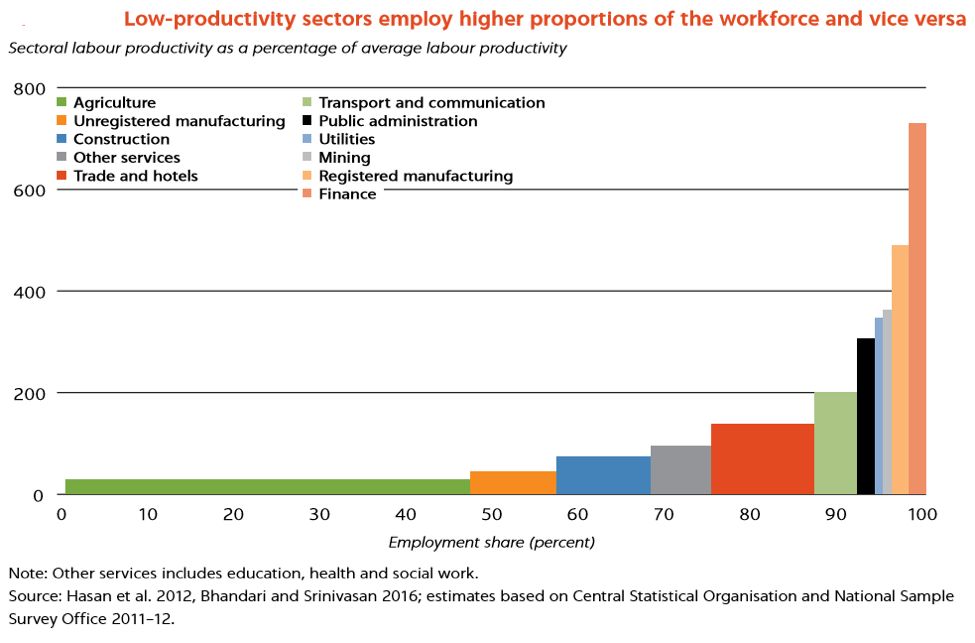

Parallel growth in labour productivity and employment can be achieved by skilling in buoyant industries, such as e-commerce and logistics. But meaningful jobs growth can only come about by skilling right. Besides trade-specific/technical skills, workers need higher-order cognitive skills that are difficult to automate. A comment on the report says, “Most of those who come out of our vocational programmes pack a single, terminal skill that resists upgrading. Not surprising then that 44% of those with computer training and 60% of those with textile related expertise are all dressed up, but sitting at home. Obviously there is no tie-in with industry, or else why should there be such a glut of vocationally trained workers? Worse, have the skills they learnt now become obsolete?”
Merely Skilling Doesn’t Work
Training workers purely for existing jobs, an approach adopted by most of the current vocational skilling programmes will simply not prepare workers for changes or impart transferable skills. ITI pass-outs face high unemployment. Equally, an Accenture survey[ii] of trainees of public–private training partnership (PPP) programmes found a third declined jobs or dropped out within a month of starting work. And with PPP programmes serving only the organised sector, 95% of the workforce falls by the wayside.
With shorter technology cycles and growing digital disruption skilling needs to become much more holistic. Take an Uber/Ola driver for example. Digital literacy- how to use GPS on smartphones; financial literacy- using payment wallets; non-cognitive skills- social and communication skills; all go towards a multi-pronged customer- focused experience.
Enhancing Transferable Skills
So what kind of skills training enhances occupational mobility imparting skills to stay relevant to market changes? Transferable skills- cutting across multiple workplaces and occupations and central to worker agility.
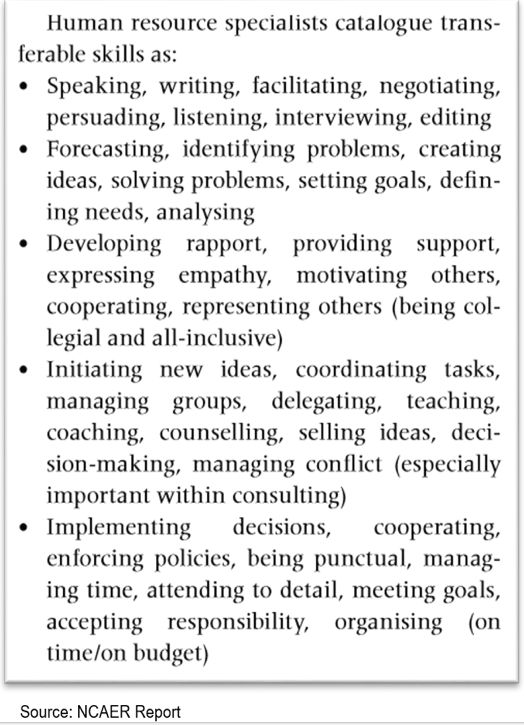

They are foundational skills ranging from communication to problem solving. In the context of rural India and our vast unorganised workforce, skills such as computer and digital literacy, financial literacy, and English-speaking knowledge are core skills enhancing worker employability alongside any other vocational training. Training limited to techniques of a specific trade or industry is least transferable. The report states higher-order transferable skills require a concerted longer-term approach.
Imparting Transferable Skills
Formal tests can certify certain cognitive skills. However, non-cognitive skills, for instance acuity, instinct and discernment are hard to measure in non-work environments. We strongly believe that work-immersive training such as apprenticeships are inherently suited to develop a multitude of faculties in trainees.
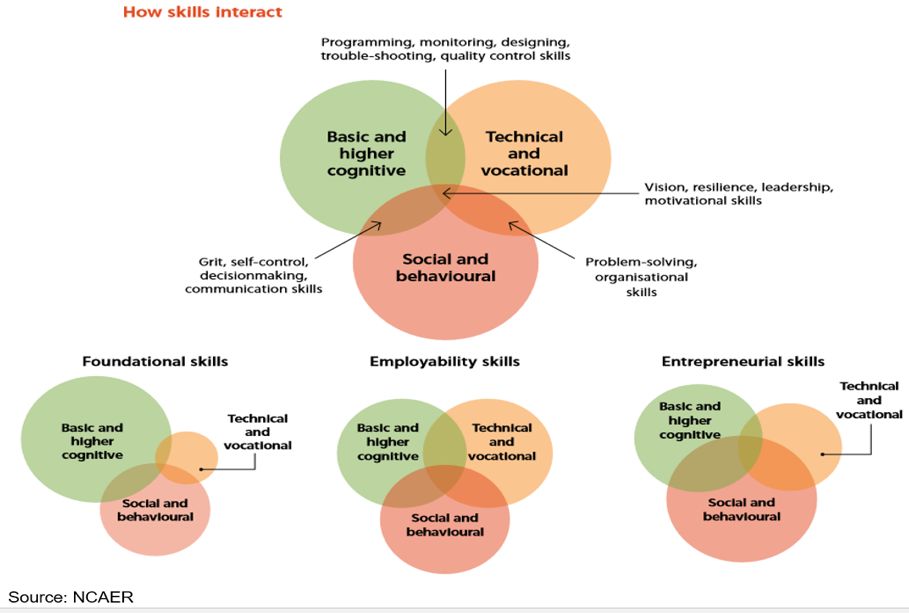

Anticipating Skills
In explaining that traditional skills of most existing jobs will require add-on skills, the report proposes policy recommendations for adapting and anticipating skills:
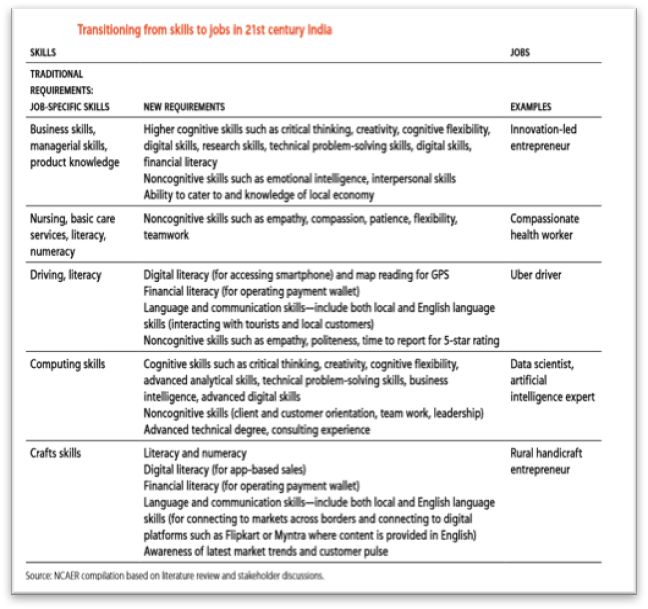

- A 15-year transferable skills focused perspective plan for 2020–35
- To be prepared by a Commission for 21st Century Skills
- Use this report for the terms of reference for such a Commission
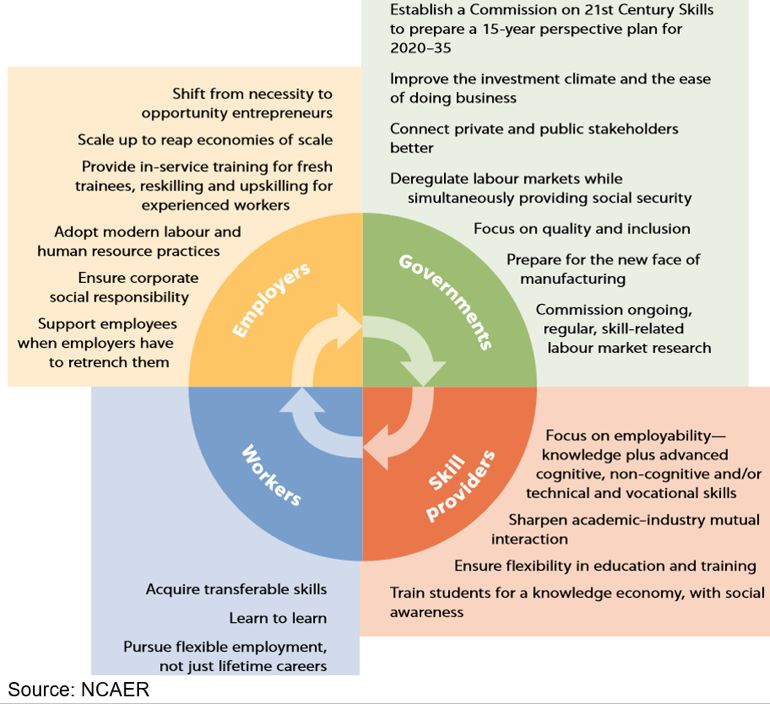

It ends with a clarion call to a participatory multi-stakeholder approach to adapt and anticipate skills that India will need in the next two or three decades.
References
[i] Main source: ‘Skilling India: No Time to Lose’ – 2018- National Council of Applied Economic Research
[ii] Overcoming India’s Skills Challenge: Transforming India into a High Performance Nation. National Skill Development Corporation, Accenture, 2013













